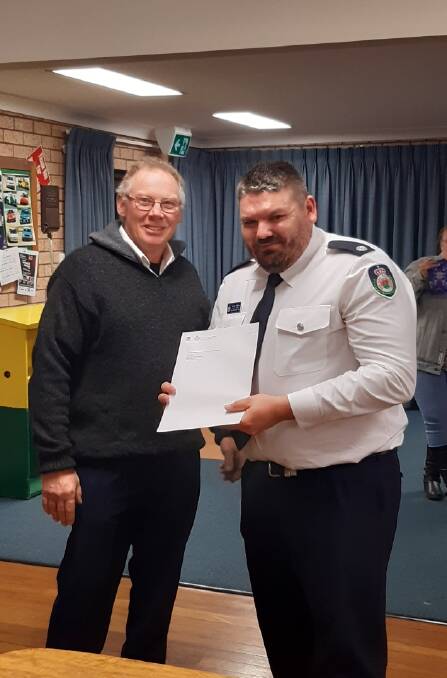
RECALLING the 2019-20 bushfires which ravaged the state, Gareth Sutton remembers one thing.
Subscribe now for unlimited access.
$0/
(min cost $0)
or signup to continue reading
The determination he and thousands of fellow Rural Fire Service (RFS) volunteers had to protect life and property as the worst fires NSW has ever seen burned around them.
Back in 2019, Mr Sutton was a brigade captain with the Raglan RFS and among the volunteers battling to contain the fire front which spread aggressively down the eastern side of the state.
His first fire strike was in September 2019, when he was among RFS fire fighters battling to contain the fire front at Wallerawang.
This month, after receiving his National Emergency Medal he spoke about the treacherous conditions experienced on the ground.
"We were seeing conditions never seen before," he said.
"Areas which shouldn't have been burning fast were burning fast. Areas where hazard reduction had been undertaken months earlier, instead of slowing the fires, it was having the opposite effect, it was speeding it up.
"On Port Macquarie, hazard reduction was done just eight months before and the fire sped up there (instead of slowing)."
He said the fact the fire was wind driven was the problem.
"There was still a fair bit of growth around, plus falling leaves which were burning," he said.
"The conditions were just so dry and hot, it was literally the worst conditions we've ever seen."
He said there were many times when he was confronted by the enormity of the task ahead.
"There were certain places where I was questioning myself," he said.
"It wasn't scary as such, you were just trying to think ahead and keep ahead of the situation.
"And most importantly keep my crew safe.
"The same tactics we have used over and over before weren't working, there were a lot of tactical changes on the fly.
"The stuff we used to do which has been successful in the past, in these conditions wasn't working.
"Stuff we did back in 2013 which worked, we were in the same areas and this time they failed.
"These fires changed a lot of things, the way fires are fought, and the way we do things."
While Gareth is now an operations officer for the RFS, stationed in the Mid Lachlan Valley, prior to this he was a volunteer fire fighter for over 20 years with the RFS and at the time of the fires, he was brigade captain.
Back in the day he said he got involved in fire fighting to fulfil a sense of community and basically help out.
"Back then the RFS was pretty much a big family affair, all my brothers were volunteers in the RFS so I joined," Gareth said.
"I really loved my time as a volunteer. I've met so many people and been to so many places. I've been given opportunity I wouldn't get anywhere else."
He said working with other volunteers was also a great experience.
"They are all very much like minded, we all join for our own reasons, but as a group they are selfless people," he said.
"Everything they do, they do as volunteers."
He said in the 2019 and 2020 fires, they were literally putting their lives on the line.
"Those summer fires, we were just doing what we could do to help, do whatever we could," he said.
"Everyone involved [in fighting the fires] are selfless people, they were prepared to give everything to people they have never met, to communities they have never even been to.
"It was just outstanding.
"Every single person who fought in those fires should be incredibly proud of themselves, and that medal. It is a just reward for what they did.
MAKING NEWS:
"Hopefully we don't have to fight fires like that for some time."
He said at times he personally wondered if they would beat the fire.
"There were a few days when I didn't think we would get on top of it," he said.
"There were times when I was thinking... what am I doing here, will I actually get home?"
But he said the RFS training kicked in.
"Protecting my crew was my number one property and there were times when the fire got too much and we had to get out," he said.
"As much as we wanted to stay and fight, we had to pull back.
"As the ranking officer I had to make the best decisions for everyone's safety and welfare, and that was at the heart of everything.
"And that not only included my crew but others including police and ambulance, I had to make sure everyone was safe.
"That is what we're trained to do."
Our journalists work hard to provide local, up-to-date news to the community. This is how you can access our trusted content:
- Bookmark www.westernadvocate.com.au
- Make sure you are signed up for our breaking and regular headlines newsletters
- Follow us on Twitter
- Follow us on Instagram
- Follow us on Google News

